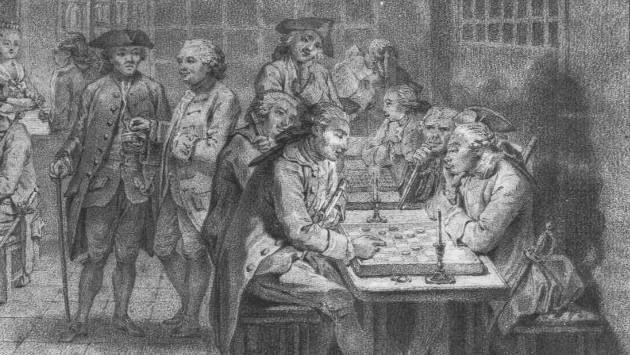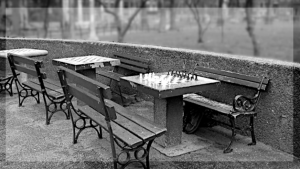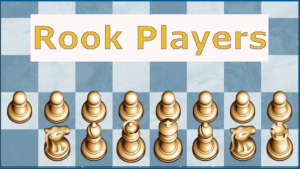
The Man Who Saved Philidor
"English chess owes more to the Rev. George Atwood than it does to any other person."
- Dale A. Brandreth, chess historian and collector extraordinaire
As most folks know, the custom of saving games didn't really begin in earnest until 1836 when William Greenwood Walker published the Labourdonnais-M'Donnell match he helped record in 1834. [William Greenwood Walker, George Walker and William Lewis all recorded games from that series and Lewis published 50 of them independently.]
In the intervening year, 1835, another Walker - George - published his famous book, "A selection of games at chess, actually played by Philidor and his Contemporaries," in which he had this to say:

"Half a century has now elapsed since Philidor soared in the height of his fame. His celebrated Treatise on Chess has been translated into most modern languages, and continues to sustain its well earned honors. Undoubtedly the most interesting sections of that publication are the games played by Philidor without seeing the board. Of these, there are but nine, and they strike us at once as being so gifted with excellence, that we feel angry at the scantiness of the allowance, and long to be afforded further proofs of the transcendent skill of our mighty master. Philidor's visits to this metropolis were spread over a long series of years—from 1747, to his death in 1795—and during that time, he must have played many hundred games of the highest order. It is, unfortunately, too notorious, that most of the chief Chessplayers are careless about noting down their games ; and in almost every case of the preservation of similar relics, we are indebted more to the zeal of the bystander, than to the generosity of the author. Philidor was rarely, if ever, known to record games of his own playing, and the same indifference has been since remarked in La Bourdonnais, Le Breton des Chapelles, and other distinguished players. The most earnest inquiries had been addressed to the last surviving contemporaries of Philidor, as well as to the remaining branches of his family yet existing in France, for any manuscript relics of which they might be possessed ; but as such applications were uniformly fruitless, the chances of any fresh publication bearing his name, became, as years rolled on, both fewer and fainter. Still there remained to us a latent, lingering hope, that sooner or later, on the breaking up of some overgrown moth-eaten library, or curious antiquarian depository, —additional reminiscences, connected with the name and epoch of Philidor, might open to the light of the nineteenth century.
This hope, I rejoice to say, has been most unexpectedly and suddenly realized,—this event, so ardently desired, has here come to pass. Without the mysterious, and oft-times suspicious, agency of an old oak chest, or black ebony cabinet, a huge parcel of bona-fide Philidorian MSS. has found its way to earth by the most simple and unromantic means of transit. The choicest part of this "treasure trove" is comprised in the present volume, and it becomes me, briefly, to give a sketch of its history and discovery.
Among the leading Chess-players in England, contemporary with Philidor, was the Reverend George Atwood. His acquaintance with mathematics was extensive *, and, between that science and Chess, were his leisure hours chiefly divided. Mr. Atwood was a pupil of Philidor, and did honor to the lessons of his master. He compiled, from various sources, a number of MS. volumes, in illustration of different branches of Chess ; and, among the rest, collected several hundred games, played either by himself, or, under his own observation, by the first players of the age. At the death of Mr. Atwood, and on the consequent dispersion of his books, the greater part of his Chess-papers fell into the hands of his friend, Joseph Wilson, Esq. F. A. S., on whose library shelves, for many years, they quietly slumbered. Mr. Wilson belonged himself to the Philidorian set, and was no mean performer. He appears to have assisted Mr. Atwood with occasional contributions, and to have thus taken a share in the formation of the MS. collections alluded to. Mr. Wilson died three years back, and, on the sale of his library **, the whole of these MSS., comprising nearly twenty volumes of various sizes, were bought by Mr. Thorpe, the bookseller, of Bedford-street, Covent Garden, in whose sale-catalogue of rare and valuable MSS., for 1833, they were displayed as below***; and from whom I hold them, 'cum privilegio,'— by the fairest of tenures—purchase. I am minute in these details, not only for the sake of removing any doubts which might otherwise reasonably exist in this country, as to the genuineness of the MSS., but for the satisfaction of my brother Chess-players in France and Germany. It may be added, that the great merit of many of the games selected, affords the strongest intrinsic evidence of their indubitable authenticity.
* Mr. Atwood was the author of several works on Mathematics ; including " A Treatise on RectilinearArches," &c.
** Mr. Wilson's Library was sold by public auction, at Messrs. Sothebys' Rooms, in Wellington-street, Strand. 1832-3.
*** Extract from Mr. Thorpe's Sale-Catalogue of MSS. 1833:—
227. Chess.—Experimental Games at Chess ; by the late George Atwood, 4l. 10s. 6d.
228. Chess.—Results of Games, played by Philidor, Count Bruhl, Bowdler, and other Chess players, describing minutely every move, with Problems concerning the game. By the Rev. George Atwood, the celebrated mathematician. Folio, 2l. 12s. 6d.
229. Chess.—Twelve volumes of Memoranda of Original Games, Notes on Philidor's Rules, &c. By the Rev. George Atwood, 5l. 5s."

Atwood's Machine
George Atwood (Attwood or even At'wood) was born in 1745 (according to some; 1746 according to HJR Murray). He went to Westminster school and graduated from Trinity College in Cambridge in 1769 after which he stayed and taught mathematics there. In 1776 he was elected a Fellow of the Royal Society.
William Pitt, British Prime Minister and one of Atwood's former students, gave Atwood a position as a personal secretary and an office in the Treasury.
Atwood's secular accomplishments include a book on on Newtonian mechanics, "A Treatise on the Rectilinear Motion," published in 1784. In it, he introduces "Atwood's Machine," used to demonstrate for the first time the laws of uniformly accelerated motion of a free-falling body due to gravity. He also did work of the theories of ship stability as well as the engineering of arches and bridges.
He was awarded the Copley Medal of the Royal Society.
(The Copley Medal was established by Sir Geoffrey Copley and is the most prestigious award give by the Royal Society of London. Other recipients include Ben Franklin, Albert Einstein and Max Planc)
As far a chess goes, Atwood was a decent amateur. He contested Philidor in many games, but most importantly, he preserved some of them, an unusual practice at that time. Murray tells us, "I do not know in what year he joined the [London] chess club, but already, in 1787, he was recording games in his note books." He also has the distinction to have been Philidor's opponent in the last games he played - at Parsloe's Club in 1795 - less than two months before Philidor died.
Of the 62 games of Philidor that have been preserved for posterity,
George Atwood recorded 14.
Below are what are considered the last two games played by Philidor -
played, at odds, against Atwood at Parsloe's Chess Club on June 29, 1795.
"There is every reason for believing that these two games (Games 46 and 47) were the last ever played by Philidor. He died six weeks after the date of this sitting, in his seventieth year. From the newspapers of the day we learn, that 'for the last two months of his life he was kept alive merely by art, and the kind attentions of an old and worthy friend.' When he played these latter games, he was, therefore, in a state of debility hardly consistent with the energy required to conduct a difficult contest ; but his Chess-intellect shone out to the last in high and undiminished brightness. As a mark of respect to the immortal name of Philidor, the Metropolitan Chess-club suspended their meetings for some time after his death. It is disgraceful to them that no funeral tablet was erected, to point out the place of his rest." -George Walker
George Allen wrote in his book "The Life of Philidor:
"Philidor, in the mean-while, aware, it appears, of nothing but that his application was going through some red-tape process or other, still kept up heart and hope, and actually gave exhibitions at the Club in February and May. At length, however, either because he felt himself sinking, or more probably because he was in immediate expectation of receiving his passport, he announced by advertisement, that 'by particular desire, and positively for the very last time, he would play, on Saturday, the 20th of June, at two o'clock precisely, three games at once against three good chess-players, two of them without seeing either board, and the third on looking over the table.' Mr. Atwood, the celebrated mathematician, was one of those players, and recorded the game in which he took part. The presence of Philidor is traced at the Club for a few days longer. On the 29th of June he played two games with Mr. Atwood at the odds of the Pawn and Two Moves, of which he lost one. Both of these games, with a reverent regard, no doubt, for the last efforts of the great master, were recorded by Mr. Atwood, and were printed from his manuscripts by Mr. Walker in 1835 for the first time."
Atwood took part in two blindfold simuls, drawing one game, winning the other. George Waler prefaced each of the games with: "Philidor plays against Mr. Atwood without seeing the board; at the same time playing two other games against different persons, under the same circumstances. Atwood receives the move." It's unclear which of these two games was part of Philidor's last blindfold simul.
Game XXXIX
Game XL
Willard Fiske gave this appraisal of George Atwood as a chess player in "Chess Monthly" 1859:
"As a chess-player Atwood was a skilful practitioner and an enthusiastic admirer of the
game, to which, during the maturer years of his life, he devoted a large portion of his leisure. He was equally fond of its theory and its practice. There are no less than thirty-two of his games extant, fought, as far as we can learn, between the years 1793 and 1800. Of these, fourteen were played, at various odds, with Philidor; seven, in which Atwood reeeived the odds of Pawn and Two Moves or of Queen's Knight for Two First Moves, were contested against Verdoni; ten took place on even terms with Wilson; and one, an even contest, between Atwood and Cotter. In regard to theoretical knowledge he seems to have been, in some respects, in advance of his age. Among all the contemporaries and immediate followers of Philidor, he alone recognized the beauty and strength of the King's Knight's Game, which has become so great a favorite with the analysts of a later and more learned age. Bruehl, Bowdler, Seymour, and all the other noted men of the period, blindly imitated the example and obeyed the teachings of Philidor, in preferring the King's Bishop's Game or King's Gambit; but Atwood, even before his great master's death, employed the then unpopular opening, and afterward practised it with a singular fondness. We find it used in every one o. his even contests that have been given to the light, whenever he had the first move. In the following train of play in the Philidor's Defence,
the ingenious sacrifice of the Knight was introduced by Atwood. Walker pronounces this innovation to be "\'highly creditable to his general talent as a chess-player.' But the services of Atwood, which will meet with the heartiest recognition from them lovers of the present time, were the pains he took to rescue from oblivion the combats of Philidor and his school. At a day when such a thing as the recording of games was hardly known, when even Philidor himself cared to preserve less than a dozen of his contests, Atwood determined that a portion at least of the famous chess-battles of the latter years of the eighteenth century should not be lost to posterity. Being a frequent attendant at Parsloe's, in St. James's street—then the seat of the chief club of the British capital and the scene of many a memorable mimic fight—he copied down such of the games as he witnessed, which seemed to him to be of sufficient interest. These have been transmitted, a precious boon, to aftertimes. With them has come a mass of manuscripts from the same pen, filled with analytical matter of which we know little, since no portion has ever been made public.
note: How many of Atwood's games still exist unpublished in the hands of Mr. George Walker we know not. That eminent chess writer would confer a great favor upon lovers of the game by giving further accounts of the Atwood'a MSS and their present state. Even inferior games, played more than half a century back, possess sufficient historical value to warrant their publication. The same remark applies to Atwood's analyses. Will not Mr. Walker oblige a public?"
The opening Willard Fiske attributes to Atwood is a line in the Philidor Counter Gambit, a seemingly sound though seldom-used respond to the Philidor Defense. There are at least 6 of these games between Atwood (playing White) and Joseph Wilson, Esq., F.A.S. (It's commonly believed that Jacob Henry Surratt introduced the Muzio to English players. While he did give the oening its misnomer, it was actually Joseph Wilson who re-discovered it "from a MS. collection of Greco's games compiled in 1623 for Nicholas Mount Stephen, which he had bought in 1763." -Murray) These games were probably played between 1787 and 1800. Atwood was clearly superior to Wilson :
In contrast, here is a game in which Howard Staunton and the Rev. Owen play Atwood's line against the team of Paul Morphy and Thomas Wilson Barnes:



